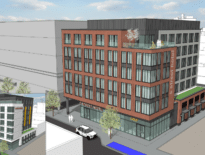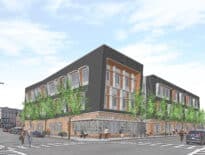Replacement of the Allston viaduct and realignment of the Massachusetts Turnpike would open up 85 acres of land for development and add a brand-new commuter rail station. Courtesy photo
A $335.4 million federal grant to rebuild a key section of the Mass. Pike and build a new transit hub in Allston will help unlock Harvard University’s plans for a big, new neighborhood. But the school isn’t the only winner, experts say.
Sen. Ed Markey disclosed the grant award Monday afternoon on Twitter, with Gov. Maura Healey’s office confirming the news, with the official announcement expected from the federal Department of Transportation later this week.
The project will see the viaduct that carries Interstate 90 past Boston University brought down to ground level, the highway’s sweeping curve through Allston straightened out and a messy tangle of off-ramps eliminated to free up around 85 acres of land for Harvard University’s new development, the first, 900,000-square-foot phase of which is already underway in partnership with Tishman Speyer with $750 million in financing from Otera Capital.
The area will be anchored by a new commuter rail and bus station, to be called “West Station,” that is also intended to include a train link to Cambridge’s Kendall Square and Boston’s North Station in the future. The Worcester Line trains and mooted future West-East Rail trains to Springfield that will eventually serve West Station normally run into South Station, on the other side of Boston’s downtown from both destinations. The link to Kendall Square could shave 10 or more minutes off commute time to that employment center for riders.
An August 2022 report by business-backed advocacy group A Better City, which had been a major voice pushing the project forward, said the Allston I-90 rebuild and associated construction of a new “West Station” commuter rail and bus hub could generate at least 12,400 jobs and 11.17 million square feet of housing, lab, office, hotel and retail space over 20 years. A Better City President & CEO Kate Dineen in a statement called the federal grant award “a massive win for Massachusetts that will deliver transformational transportation options, unprecedented development opportunities, and critical environmental benefits.”
A sizable chunk of that growth will happen as part of Harvard’s own, ambitious project.
But Allston has already begun to emerge as a life science cluster in its own right, said Liz Berthelette, head of Northeast research and head of national life science research at commercial brokerage Newmark.
“We’ve already seen investment and development in these neighborhoods. As more investment and development happens and as the [transportation] infrastructure continues to expand, we’ll see more growth,” she said.
That said, projects like the I-90 realignment can take years, as can mega-developments. Berthelette compared the neighborhood’s likely overall trajectory to Federal Realty Investment Trust’s Assembly Row project in Somerville, which began planning in the early 2000s and still has an unbuilt parcel, or DivcoWest’s Cambridge Crossing project, which the developer bought from HYM Investment Group in 2015 and has seven parcels still unbuilt.
“It remains to be seen what the benefits are specifically, but I do think that opening up acres of developable land is certainly a positive for other owners and developers and investors who might be looking at the Allston-Brighton neighborhood,” she said.
Mark Fallon, head of research at commercial brokerage Hunneman, said if Harvard includes a substantial life science component in its project, as many expect, it likely won’t harm the numerous proposed biotech buildings – many of them speculative – under construction in the neighborhood despite the current softness of tenant demand.
“Yes, there’s a short-term immediate issue with life science supply but over the long and medium term there isn’t going to be enough of it,” he said.
Another winner could be 35 miles to Allston’s west: the city of Worcester. Although Worcester Regional Chamber of Commerce CEO Tim Murray was not available for an interview Tuesday morning, he’s been a strong backer of the Allston I-90 project. Last summer, he told a symposium of local officials, advocates and developers organized by A Better City that the project was “a huge opportunity, not only for the city of Boston but also for Central Massachusetts.” As evidence, he cited the city’s recent downtown multifamily and biomanufacturing building boom that was in part spurred by a tripling of Worcester Line train service a decade ago.
Lt. Gov. Kim Driscoll echoed that line in a statement issued by Healey’s office along with a package of other celebratory quotes from the state’s congressional delegation, Boston Mayor Michelle Wu and top state officials: “This federal grant will help build a project that will have widespread benefits in the decades ahead, improving access to the Charles River, between Boston and points west, and for everyone taking trips in the Allston area.”
But with an estimated $2 billion price tag, the federal dollars – over $160 million less than the state initially asked for – plus a combined $300 million from Harvard, Boston University and the city of Boston still don’t add up to even half the project’s cost, meaning the state will likely be on the hook for the rest of the budget. The Healey administration’s announcement offered no specifics of how it might seek to close that gap, although StreetsBlog reports Turnpike toll revenue will factor into the decision.
And while Harvard, neighborhood activists and the city of Boston inked a deal in 2022 on the share of affordable housing in the development, Harvard’s development still needs to go through the city’s land-use and zoning permitting process. In addition, the I-90 project itself still needs to finish environmental permitting, and questions are being raised about the Massachusetts Department of Transportation’s plans for a street grid of huge, four- and five-lane boulevards for the land Harvard plans to develop, suggesting many details still need to be worked out.






